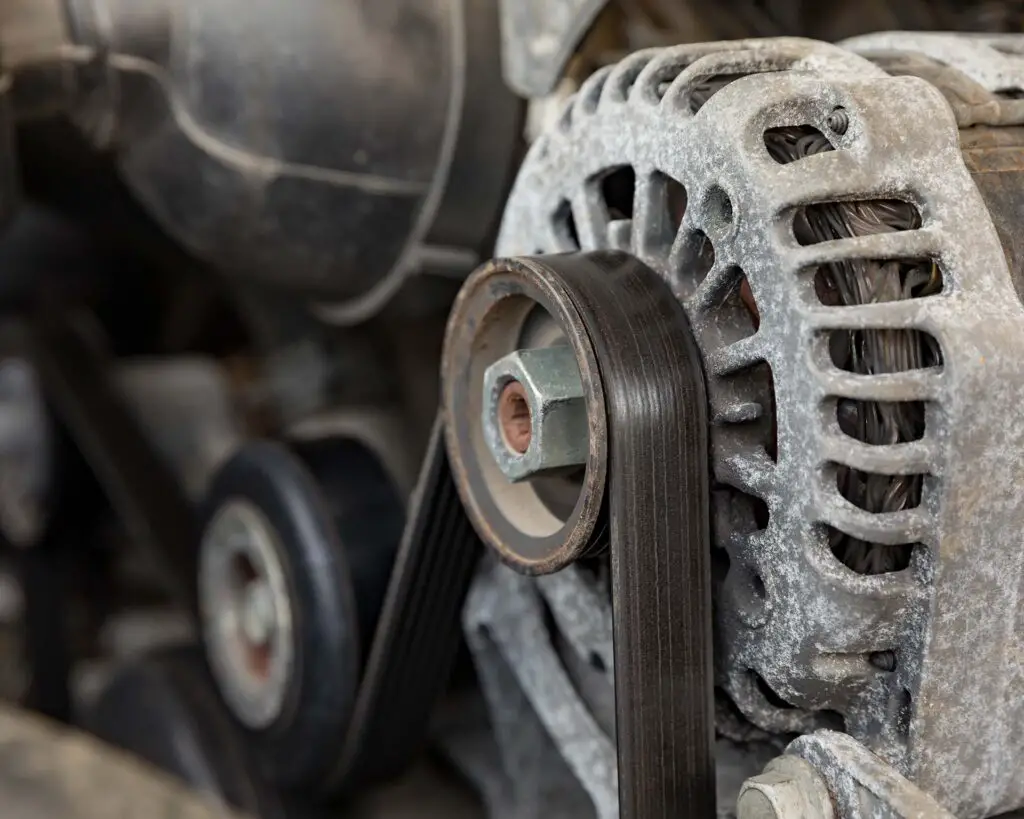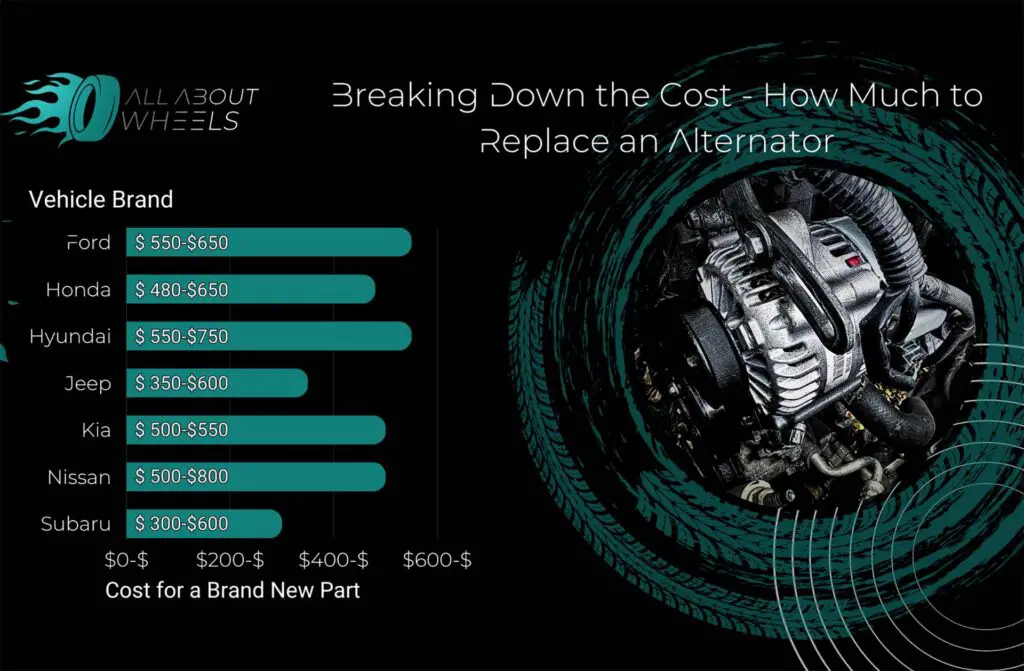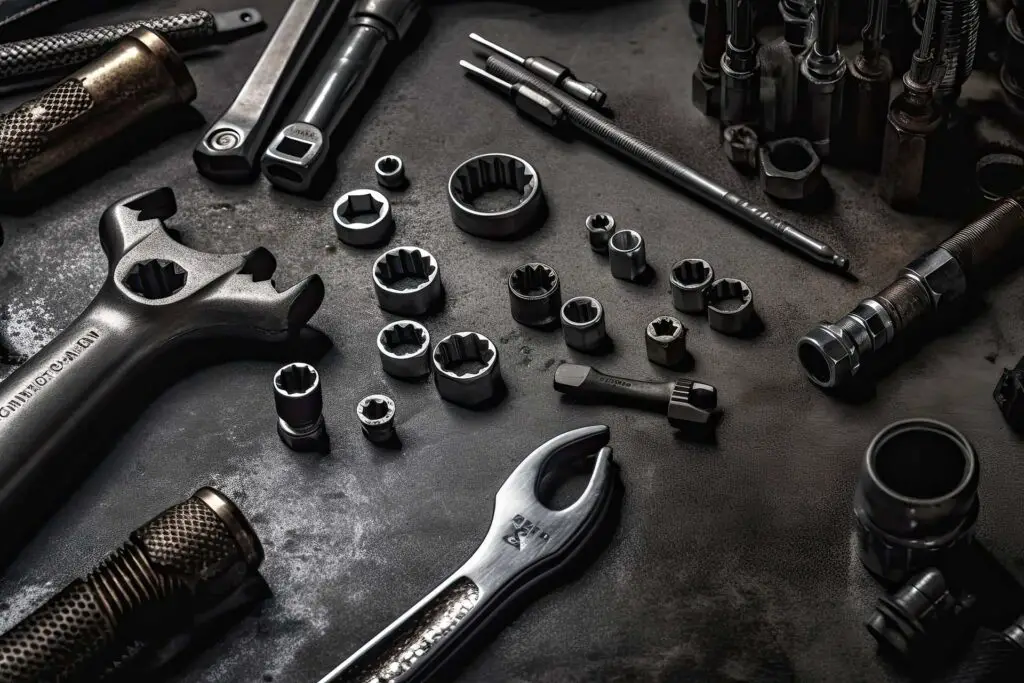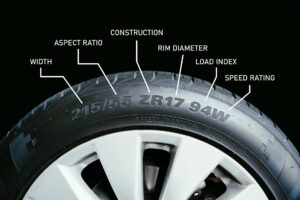We’ve all been there – one moment, you’re cruising down the highway, the next, your vehicle’s electrical systems start to fail. And once this crucial component gives up on you, you’re left wondering – how much to replace an alternator? Let’s break down the costs and everything else you need to know about this vital car part.
Typically, replacing an alternator can cost anywhere between $350 and $900, and this includes the cost of labor and the replacement part itself. However, it’s not a one-size-fits-all kind of deal. The final bill depends on numerous factors like the make and model of your car, where you live, and the choice of the repair shop. There are also potential additional costs to consider, such as replacing the serpentine belt or the battery.
What Is the Role of an Alternator in the Car?
An alternator is like the heart of your car’s electrical system. It’s a generator that converts mechanical energy into electrical energy, powering up everything from the headlights to the car battery. So, while the battery starts the vehicle, it’s this component that keeps everything running smoothly once you’re on the road.
Besides powering the car’s electrical system, here are the crucial roles of an alternator:
- Voltage regulation – ensures that the voltage is stabilized, offering consistent and optimal power to all electronic components,
- Supports electrical components – powers up essential elements like headlights, air conditioning, radiator fans, and the radio, ensuring comfort and safety,
- Battery lifespan – by continuously charging the battery while the vehicle is running, it helps in extending this crucial component’s lifespan.

What Are the Signs of a Failing Alternator?
Typically, alternators can last anywhere between 40,000 to 100,000 miles, so knowing the common symptoms associated with this generator failing to do its job is crucial. It not only helps in preventing potential breakdowns but also in avoiding costly repairs. Here are the signs that it’s time to figure out how to replace an alternator:
- Flickering or dimming lights,
- Warning light on the dashboard,
- The car battery is consistently dying or weak,
- Grinding or whining noises,
- Problems with electrical components.

How Much to Replace an Alternator – Components Cost Breakdown
Once they find themselves in this situation, one of the first questions many car owners ask is – how much is it to replace an alternator? The answer isn’t so straightforward – it depends on various factors, including the make and model of your four-wheeler.
Generally, you can expect to pay anywhere between $350 to $900 for this service. But before you start brainstorming how to cut down car expenses, let’s break this cost into its main components:
Parts Cost
Alternators, like any car parts, can vary widely in price. They can average anywhere from $300 to $700, depending on the model and brand. It’s a cost that can be somewhat controlled, though. For instance, opting for a refurbished component instead of a brand-new one can save you a significant amount.
Labor Cost
You’re probably wondering – how long does it take to replace an alternator? Typically, the whole ordeal takes about 2-3 hours to complete. The labor cost will usually be a bit over $100, but it also depends on several factors, including where you live and where you get the job done.
In most cases, you’re looking at an average of $350−$500 in total for the replacement if no other parts need to be changed. However, keep in mind – if you opt for dealership parts and labor, don’t be surprised if the bill climbs over $500.
Additional Costs
It doesn’t always end with just replacing this vital generator. There might be additional costs to consider, like replacing the serpentine belt which will set you back an additional $20 to $50. And if the battery needs to be changed, it can easily double your bill. There’s also the not-so-small matter of towing costs if the vehicle can’t be driven.
Which Factors Are Influencing the Final Cost of the Replacement?
We’ve outlined the general costs involved in this replacement job, but, as mentioned, the exact amount you’ll pay can be influenced by numerous variables. They might not seem like it, but these factors can make all the difference between a bill that’s manageable and one that’s a financial headache. Let’s dive deeper into some of the more specific elements that play a pivotal role in determining these costs.
The Make and Model of Your Vehicle Is a Deciding Factor
Obviously, the specific make and model of your four-wheeler is one of the primary factors influencing the total cost. This is due to the simple fact that different vehicles may require different types of alternators, each with its own price tag.
Luxury cars or specific models might need specially designed alternators, which can be way more expensive. On the other hand, common four-wheelers such as your average family SUV or a small city car might have more readily available and affordable options. Here’s a quick breakdown to get a clearer picture:

Your Location and Choice of the Repair Shop Also Play a Part
Another significant variable in this equation is where you choose to have the replacement done. This is because there’s a noticeable price variation between franchise repair shops, independent mechanics, and dealerships.
While dealerships often provide specialized expertise, their services come at a premium. Independent mechanics can offer competitive pricing, but it’s crucial to consider their reputation and the quality of their work. Your geographical location also affects labor costs, with urban areas typically being more expensive than rural ones.

Here Are Some Efficient Ways to Save On Alternator Replacement
The average cost to replace this crucial vehicle component is definitely not a pretty sight for the wallet, and it’s only natural to start seeking ways to cut down on those car expenses. Fortunately, there are strategies to minimize the financial blow without compromising the quality of the replacement.
The most pivotal step is shopping around. Always get multiple quotes when you need to hire a mechanic to ensure you’re getting the best deal possible. It’s equally essential to sift through online reviews and heed word-of-mouth recommendations to guarantee that your car is in competent and reliable hands.
Refurbished vs. Brand-New Parts – Pros and Cons
Choosing between refurbished and brand-new parts is another avenue to explore for savings. As previously mentioned, remanufactured parts can be a more budget-friendly option. However, the key is ensuring that the refurbishing was done by a reputable facility to avoid premature part failure.
Here’s an overview of the pros and cons to figure out if you should get a refurbished component or stick to ordering a brand-new one:
| Aspect | Refurbished Alternators | Brand-New Alternators |
| Cost | More affordable | More expensive |
| Environmental Impact | Eco-friendly and reduce waste | Manufacturing new parts consumes more resources |
| Quality and Reliability | Quality can vary, depending on the remanufacturing facility | Consistent, high-quality, and reliable |
| Warranty and Support | Shorter warranty periods and limited support | Longer warranty and extensive support |
Those With Some Mechanical Expertise Can Try to Replace the Alternator Themselves
For the mechanically inclined, replacing this component can be a viable DIY project, leading to significant savings. If you’ve tinkered under the car hood, replacing U-joints or some spark plugs back in your day, this might be a route to consider. Here are the tools you’ll need for the job:
- Wrench set,
- Screwdrivers,
- Ratchet and sockets,
- Multimeter,
- Gloves and safety goggles.
However, if you’re not well-versed in auto mechanics, seeking professional help is your best bet. Sure, it’s tempting to take on the task to save some money on the side, but improper installation can lead to more severe and expensive issues down the road.

Preventative Measures and Maintenance Tips to Ensure Your Alternator Performs Well for Miles to Come
Once you’ve gone through with the replacement, it’s all about preventative care from that point on. A regular check-up and maintenance routine isn’t just about ensuring that your four-wheeler runs efficiently – it’s also about safeguarding your newly replaced component for longevity.
Here are some signs to watch out for and address as soon as possible:
- The car is having trouble starting or it stalls frequently,
- The battery remains consistently weak or dead, even with the replacement,
- The trouble with your vehicle’s electric components persists.
It’s Time to Get Back on the Road Stronger Than Ever
There you have it – the ins and outs of the not-so-fun, yet utterly essential world of replacing this vital vehicle generator. While this isn’t a question any of us want to ask, knowing the breakdown of costs and potential savings might just take the sting out of the whole ordeal. Remember, a little savvy shopping and preventative TLC can go a long way in keeping those wheels turning without breaking the bank.
Frequently Asked Questions
Can I Drive My Car if the Alternator Goes Bad?
It’s not advisable. A failing generator can lead to a dead battery or other issues, such as reduced power to the electrical system, causing the car to stall. If you suspect this component is going bad, it’s best to get it checked and replaced if necessary to avoid being stranded.
How Can I Test My Alternator to Know if It’s Functioning Properly?
You can use a multimeter to check the voltage. With the engine off, a healthy battery should read just over 12 volts. Start the engine, and the reading should increase to around 13-14 volts if the generator is charging the battery correctly. If not, it might be time for a replacement.
Is It Common for an Alternator to Fail?
Alternators have a lifespan and can wear out, like any car part. Generally, they should last between 7 to 10 years or approximately 40,000-100,000 miles. However, this can vary depending on the vehicle’s usage, maintenance, and overall condition.
Can a Bad Battery Affect the Alternator?
Absolutely, a failing battery can put extra strain on this component as it tries to keep the battery charged, potentially leading to premature failure. It’s essential to address battery issues promptly to protect the generator and other electrical components in your vehicle.
What Is the Average Warranty on a New Alternator?
The warranty can vary but generally ranges from 1 to 3 years, depending on the manufacturer and whether the part is new or remanufactured. Always check the warranty terms before purchase to understand the coverage and limitations.








